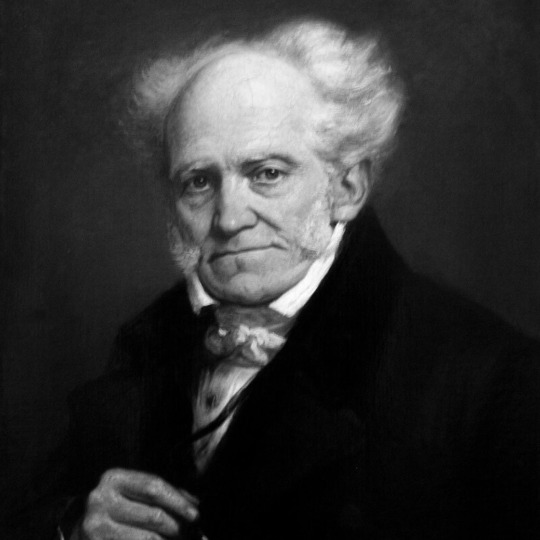#SCHOPENHAUER
Explore tagged Tumblr posts
Text

E. Gryzanovski, "Arthur Schopenhauer and His Pessimistic Philosophy"
521 notes
·
View notes
Text
We are always living in expectation of better things, while at the same time we often repent and long to have the past back again. We look upon the present as something to be put up with while it lasts, and serving only as the way towards our goal. Hence most people, if they glance back when they come to the end of life, will find that all along they have been living ad interim; they will be surprised to find that the very thing they disregarded and let slip by unenjoyed was just their life--that is to say, it was the very thing in the expectation of which they lived. Of how many a man may it not be said that hope made a fool of him until he danced into the arms of death. - Arthur Schopenhauer, German philosopher (1788-1860)
86 notes
·
View notes
Text

#philosophy#quotes#Arthur Schopenhauer#Counsels and Maxims#Schopenhauer#politeness#rudeness#manners#etiquette#civility#ethics#wisdom
186 notes
·
View notes
Text

“Talent hits a target no one else can hit; Genius hits a target no one else can see.”
— Arthur Schopenhauer
#arthur schopenhauer#schopenhauer#literature#lit#literture lover#literature quote#literature quotes#philosophy#philosophical#philosopher#philosophers#philosophy of life#philosophy quote#philosophy quotes#quote#quotes#excerpts#excerpt#literature lover#quoteoftheday#booklover#book#bookworm#books#booklr#book quotes#book quotations
133 notes
·
View notes
Text
A little Schopenhauer for @.monsterbetch on Twitter! 🧋

#nay draws#schopenhauer#monsterbetch#you have to go see the amazing Easel piece from this trade its SO pretty...
484 notes
·
View notes
Text

Arthur Schopenhauer, ''Die Kunst und das Schöne Heim'', #3, Dec. 1958
"Die Zeit ist eine Vorstellung, aus der sich alles wegdenken läßt, nur nicht sie selbs" (Time is an idea from which everything can be thought away* except itself) *can also be translated as "removed"
#arthur schopenhauer#die kunst#philosophy#schopenhauer#german philosophy#The World as Will and Representation#the world as will and idea#German Idealism
30 notes
·
View notes
Text


“In Sisyphus, we can suddenly see Camus' basic mistake. Life, he explains, is "absurd"—meaningless. You get up in the morning, go to work, spend four hours in the office or factory, eat lunch, work four more hours, go home, eat, sleep, for five days a week— endlessly. And one day you suddenly feel a great weariness and ask: "Why?" One stage further still, and you begin to experience what Sartre calls "nausea," "sensing to what degree a stone is foreign and irreducible to us, with what intensity nature or landscape can negate us. At the heart of all beauty lies something inhuman. . . ." We manage to live with material objects by imposing our feelings on them, until the truth dawns upon us. You see a man in a telephone booth, and again you become aware of the absurd. All of his expressions are part of a dumb show.
This last example really gives the game away. For this kind of absurdity is untrue. Camus' absurdity is not reality seen naked; it is reality deliberately distorted or drained of meaning. To point to a reality drained of meaning, and then to claim that this example proves reality itself is meaningless, is a strange kind of logic. Camus' vision of the world is the vision of a young romantic, heavily tinged with self-pity and a sense of personal inadequacy. Nietzsche began his career in much the same way, by swallowing Schopenhauer in one monstrous gulp, and then groaning with indigestion for two or three years. But Nietzsche outgrew his juvenile pessimism, and created Zarathustra. Camus found the process of transition slower and more painful, because he insisted on clinging to the fallacy that "absurdity" (or "nausea") is a vision of the fundamental truth—life seen without illusions. His failure to see through the fallacy is typical of the lack of logic that characterizes French philosophy in general.” - Colin Wilson, ‘“Lucky” Camus’ (August 1979)
#colin wilson#camus#albert camus#sartre#jean paul sartre#nietzsche#schopenhauer#existentialism#absurdism#nihilism#philosophy#france#french#zarathustra#sysiphus
19 notes
·
View notes
Text
HAYAT KURALI No.19 "Öfke ya da nefreti kelimelerle ya da tavırlarla göstermek yararsızdır, tehlikelidir, akıllıca değildir, gülünçtür, bayağıdır."
Mutlu Olma Sanatı, Arthur Schopenhauer
#arthur schopenhauer#Schopenhauer#edebiyat#kitap#anlamlı sözler#kitap alıntıları#yazın#kitap tavsiyesi#kitap listesi#kitap önerisi#öfke#nefret#mutlu olma sanatı
170 notes
·
View notes
Text

“All happiness is of a negative rather than positive nature, and for this reason cannot give lasting satisfaction and gratification, but rather only ever a release from a pain or lack, which must be followed either by a new pain or by languor, empty yearning and boredom.”
-Arthur Schopenhauer
#Schopenhauer#the world as will and representation#happiness#nietzsche#philosophy#Europe#European thought
34 notes
·
View notes
Text
Cringetober day 8 ;)



+ meme extra de Schopenhauer
#samuraideaceroart#ace attorney#gyakuten saiban#phoenix wright#lotta hart#miles edgeworth#knuckles#cringetober#cringetober 2024#art#schopenhauer
22 notes
·
View notes
Text
In the philosophy of Baruch Spinoza, conatus (/koʊˈneɪtəs/; wikt:conatus; Latin for "effort; endeavor; impulse, inclination, tendency; undertaking; striving") is an innate inclination of a thing to continue to exist and enhance itself. This thing may be mind, matter, or a combination of both, and is often associated with God's will in a pantheist view of nature. The conatus may refer to the instinctive will to live of living organisms or to various metaphysical theories of motion and inertia. Today, conatus is rarely used in the technical sense, since classical mechanics uses concepts such as inertia and conservation of momentum that have superseded it. It has, however, been a notable influence on later thinkers such as Arthur Schopenhauer and Friedrich Nietzsche.
Wikipedia
#quote#philosophy#conatus#Baruch Spinoza#Spinoza#Arthur Schopenhauer#Schopenhauer#Friedrich Nietzsche#Nietzsche#theology#God
47 notes
·
View notes
Text

Arthur Schopenhauer, Parerga and Paralipomena: Short Philosophical Essays
151 notes
·
View notes
Text

Schopenhauer cookin’ one sentence into this book. 5 stars already.
101 notes
·
View notes
Text

#philosophy#quotes#Arthur Schopenhauer#On the Basis of Morality#Schopenhauer#animals#compassion#virtue#good#character#justice#kindness#ethics
15 notes
·
View notes
Text

“Talent hits a target no one else can hit; Genius hits a target no one else can see.”
— Arthur Schopenhauer
#arthur schopenhauer#schopenhauer#literature#lit#literature lover#literature quote#literature quotes#philosophy#philosophical#philosopher#philosophers#philosophy of life#philosophy quote#philosophy quotes#german philosophy#quote#quotes#excerpts#excerpt#quoteoftheday#booklover#book#bookworm#books#booklr#book quotes#book quotations
124 notes
·
View notes
Text
One should use common words to say uncommon things.
- Arthur Schopenhauer
17 notes
·
View notes